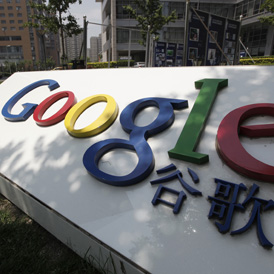China denies Google Mail hacking accusations
The Chinese Government rejects accusations it is behind a wave of hacking attacks. But a former spy tells Channel 4 News that some cyber espionage is “unquestionably” state-sponsored.
The latest victim of hacking is Google Mail, which said the email accounts of US officials, military personnel and journalists had all been compromised. Google said the attack on Gmail had been traced to China’s Shandong province, although it stressed it could not definitively state its origins.
The prospect of cyber espionage has been raised as the targets of the attacks were high-profile individuals, whose emails might have contained sensitive and secret information. Google said it had disrupted the campaign and notified victims and the relevant authorities.
But on Thursday the US government said it had not formally raised Google Inc’s allegations of hacking with the Chinese government because the incident is still under investigation.

In recent weeks, reports in the United States suggest that major defence companies, including Lockheed Martin and L-3 Communications Holdings, may also have been hacked in unconnected incidents.
But the Chinese Government angrily denied any involvement in the Google hacking incident.
The claims of so-called government support for hacking are completely unfounded. Chinese Government spokesman
Foreign Ministry spokesman Hong Lei said: “Hacking is an international problem and China is also a victim. The claims of so-called government support for hacking are completely unfounded and have ulterior motives.”
Cyber warfare
The issue of cyber warfare has escalated in recent weeks with US officials declaring a deliberate hack to obtain sensitive or secret information is an “act of war”.
A Pentagon spokesman told the Wall Street Journal: “If you shut down our power grid, maybe we will put a missile down one of your smokestacks.”
In May, the Chinese Government also admitted the existence for the first time of an elite cyber warfare unit in its army – but stressed it was for defence purposes only.
Read more: China admits cyber warfare unit
There have also been reports linking previous hacking attacks to educational institutions in China.
Last year the New York Times named Lanxiang vocational school in Jinan as one of two educational institutions linked to previous cyber attacks against Google. The school, which is about 250 miles south east of Beijing, specialises in technical subjects, including computing. It has repeatedly denied any involvement.

Nigel Inkster, an intelligence expert, told Channel 4 News that cyber espionage is happening on a “very broad spectrum” and much of it was state-sponsored, although he did not comment on specifics.
“Some of it is unquestionably state-sponsored. It is in this context that China is often mentioned – and there is no question in the western intelligence community that there is a case to answer,” said Mr Inkster, a former spy and now Director of Transnational Threats and Political Risk at the International Institute for Strategic Studies.
But he said that many of the hackers were likely to be lone operatives working under a modern-day “letter of marque”, a licence dating from the days of naval warfare.
It was a government licence authorizing a private vessel to attack and capture enemy vessels – the opposite of unlicensed piracy.
“So we are seeing privateers, individuals engaged in the pursuit of information for their own commercial interest, operating under a kind of ‘letter of marque’ from the state,” he said.
Regardless of the origins of the attack, Mr Inkster said the world had to start taking cyber warfare and espionage seriously.
“The internet was never really designed for security, but governments and the private sector are astonishingly complacent and naive,” he said.
“But it is starting to dawn on people.”
-
Latest news
-
Taylor Swift’s new break-up album breaks records3m

-
NHS trust fined £200K for failings that led to death of two mental health patients3m

-
Sunak vows to end UK ‘sick note culture’ with benefit reform3m

-
‘Loose talk about using nuclear weapons is irresponsible and unacceptable’, says head of UN’s nuclear watchdog3m

-
‘There wasn’t an Israeli attack on Iran,’ says former adviser to Iran’s nuclear negotiations team7m

-




